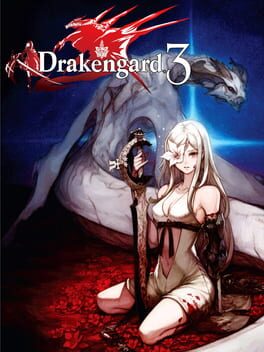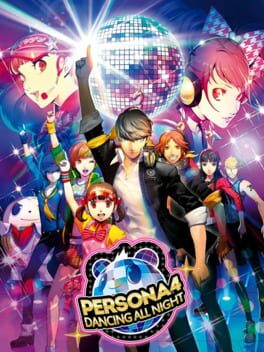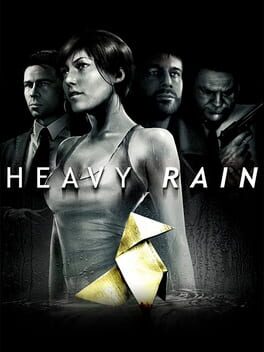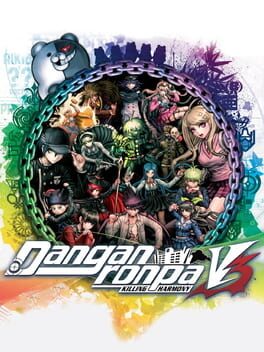laladotnet
Bio
Bon Voyage
Bon Voyage
Badges

GOTY '23
Participated in the 2023 Game of the Year Event

Shreked
Found the secret ogre page

1 Years of Service
Being part of the Backloggd community for 1 year

Pinged
Mentioned by another user

Donor
Liked 50+ reviews / lists

Gone Gold
Received 5+ likes on a review while featured on the front page

Gamer
Played 250+ games

Well Written
Gained 10+ likes on a single review

Popular
Gained 15+ followers

GOTY '22
Participated in the 2022 Game of the Year Event

Liked
Gained 10+ total review likes

Best Friends
Become mutual friends with at least 3 others

Noticed
Gained 3+ followers

N00b
Played 100+ games
Favorite Games
257
Total Games Played
006
Played in 2024
038
Games Backloggd
Recently Played See More
Recently Reviewed See More
Signalis is a game which constantly leaves you with a want for something more, glimpses of beautiful warmth through its eternally stunning style mesmerise us into wanting more and more but after eternity we are left with nothing. The game and its story all exist through the lenses of homages, influences and references, all a parallel to characters who are nothing but memories of experiences they never lived and just as those characters mourn memories and lives that were never theirs we too become entrenched in a life we never lived, as tears flow and flow and we replay and relieve to find answers that will never ever come no matter how hard we look. And just as the characters, we are faced with the abominable challenge of loss and nothing more….
Please, just let me stay be your side a little longer.
Please, just let me stay be your side a little longer.
This review contains spoilers
Danganronpa sucks, this is a sentiment most of my friends hold towards the series and despite my enjoyment of the second game, it’s an opinion I’ve shared on the series too. The last game that I ever thought would also hold this sentiment was Danganronpa V3: Killing Harmony itself.
At its core V3 attempts, and succeeds, to make a meta-statement on the over-saturation and milking of series’, consumer entitlement and what happens when the same thing is demanded over and over again, all of this being done while the game parodies itself and Danganronpa as a whole.
What V3 shows us is what happens when new danganronpa games, animes, mangas, spin-offs, adaptations are demanded, we get left with a cruel cycle of a cruel game that lacks any sort of originality or creativity. The V3 in the games title actually standing for 53, is an incredibly blunt jab at the milking of the series by the point of this games release, while the repetition of certain aspects in the murders of the game, as they parallel murders from the previous games, is a great point about the lack of creativity that comes from something being milked. Towards the ending, Tsumigi/Junko 53 constantly refers to herself and her plan as a perfect copy, this being another point about the lack of originality in such a worn out series, you could even read her cosplays of previous characters during this point of the game as commentary on the fanservice usually expected towards the end of a Danganronpa game. The game refers to Junko showing up and the hope and despair themes as an expected constant of the franchise, something that cannot change because what people want more then anything is the same thing over and over, and that line of thinking is something the game heavily discourages.
On a textual level, the main theme of V3 is Lies and Truths but towards the end of the game it almost awkwardly shifts to returning to the series’ staple themes of hope and despair, this shift is a great drilling in of those points the game is making about creativity and such, Danganronpa must be about hope and despair so the game goes back to being about hope despair before the protagonists reject Danganronpa and it’s main themes to forge their own path away from killing games.
One of the main messages of the game is that fiction can change the world, and it’s the main theme which I think is what lends the ending an optimistic tone rather than the cynicism you’d expect from the a game that appears to have a lot of self loathing towards itself and the series as a whole. This message is quite pertinent and strong, a reminder that even if the game was just a fiction in its own universe it can still hold weight but constantly demanding more of the same thing, the same killing games over and over is bad and that Danganronpa is something oversaturated that needs to end.
While I do enjoy the majority of the cast, along with most of the chapters and trials, it is one of the main ways that the game satirises the series. Something that I think ties into this idea, while also tying into the themes of Danganronpa as a piece of fiction, is how one note some of the characters feel. Tsumigi believes fictional characters to be unimportant nothingness so her character, as someone vapid and unimportant until the final few minutes, reflects this. Kaede after receiving her ultimate talent has about 70% of her character become piano references. This like of thinking could be applied to most characters, and while most of them (Miu, Maki and Kokichi being the ones that spoke to me the most) have pretty good arcs and inner conflicts, I think they are unequivocally ‘Danganronpa’ in a way to satirise the series’ reliance on tropes and to be an introspective mocking of its own writing.
The overall murders and mysteries in V3 I found pretty compelling but with the way they repeat aspects from previous games while also paralleling them, it again relates to that idea of unoriginality in an oversaturated series while also poking fun at that other games in the series for relying so heavy on a formulaic structure.
My biggest criticism with V3 is that I feel it doesn’t go far enough with its satirising of Danganronpa. I definitely think it parodies the series in a lot of ways but I’m still left feeling like it could’ve been more extreme with mocking the worst tropes of the series, this definitely would’ve helped the twist land with a much better execution too.
The one undeniably great thing about V3 is it’s soundtrack. Just like it’s predecessors, Masafumi Takada created a masterpiece of a video game ost with a variety of amazing tracks all perfectly suiting the scenes they accompany, it also flawlessly reuses tracks from previous games. The highlight of Danganronpa gameplay are the trials and they wouldn’t be nearly as amazing without the brilliant songs that are used throughout the sequences, the same could be said for how much songs like Beautiful Lie bring to the atmosphere while exploring the setting. Killing Game Completion Ceremony is the soundtracks greatest song, it carries a sense of somber melancholy littered with slight hope which perfectly captures the essence of the ending, it is the perfect musical accompaniment for the end of Danganronpa.
What V3 provides is the perfect ending for a series as flawed and ridiculed as Danganronpa, a stark and bold comment on over saturation of art and the perversion of a series’ original purpose, while also providing some good characters who tie back into the theme of fiction. It is certainly not perfect, and it isn’t the best execution of such a shocking twist but for what it says about itself, it’s franchise and fiction as a whole, it’s something I can’t help but love. It’s a simple game but even then I feel like I haven’t touched on many of the aspects I adore from it, simply a flawed but brilliant work of fiction.
At its core V3 attempts, and succeeds, to make a meta-statement on the over-saturation and milking of series’, consumer entitlement and what happens when the same thing is demanded over and over again, all of this being done while the game parodies itself and Danganronpa as a whole.
What V3 shows us is what happens when new danganronpa games, animes, mangas, spin-offs, adaptations are demanded, we get left with a cruel cycle of a cruel game that lacks any sort of originality or creativity. The V3 in the games title actually standing for 53, is an incredibly blunt jab at the milking of the series by the point of this games release, while the repetition of certain aspects in the murders of the game, as they parallel murders from the previous games, is a great point about the lack of creativity that comes from something being milked. Towards the ending, Tsumigi/Junko 53 constantly refers to herself and her plan as a perfect copy, this being another point about the lack of originality in such a worn out series, you could even read her cosplays of previous characters during this point of the game as commentary on the fanservice usually expected towards the end of a Danganronpa game. The game refers to Junko showing up and the hope and despair themes as an expected constant of the franchise, something that cannot change because what people want more then anything is the same thing over and over, and that line of thinking is something the game heavily discourages.
On a textual level, the main theme of V3 is Lies and Truths but towards the end of the game it almost awkwardly shifts to returning to the series’ staple themes of hope and despair, this shift is a great drilling in of those points the game is making about creativity and such, Danganronpa must be about hope and despair so the game goes back to being about hope despair before the protagonists reject Danganronpa and it’s main themes to forge their own path away from killing games.
One of the main messages of the game is that fiction can change the world, and it’s the main theme which I think is what lends the ending an optimistic tone rather than the cynicism you’d expect from the a game that appears to have a lot of self loathing towards itself and the series as a whole. This message is quite pertinent and strong, a reminder that even if the game was just a fiction in its own universe it can still hold weight but constantly demanding more of the same thing, the same killing games over and over is bad and that Danganronpa is something oversaturated that needs to end.
While I do enjoy the majority of the cast, along with most of the chapters and trials, it is one of the main ways that the game satirises the series. Something that I think ties into this idea, while also tying into the themes of Danganronpa as a piece of fiction, is how one note some of the characters feel. Tsumigi believes fictional characters to be unimportant nothingness so her character, as someone vapid and unimportant until the final few minutes, reflects this. Kaede after receiving her ultimate talent has about 70% of her character become piano references. This like of thinking could be applied to most characters, and while most of them (Miu, Maki and Kokichi being the ones that spoke to me the most) have pretty good arcs and inner conflicts, I think they are unequivocally ‘Danganronpa’ in a way to satirise the series’ reliance on tropes and to be an introspective mocking of its own writing.
The overall murders and mysteries in V3 I found pretty compelling but with the way they repeat aspects from previous games while also paralleling them, it again relates to that idea of unoriginality in an oversaturated series while also poking fun at that other games in the series for relying so heavy on a formulaic structure.
My biggest criticism with V3 is that I feel it doesn’t go far enough with its satirising of Danganronpa. I definitely think it parodies the series in a lot of ways but I’m still left feeling like it could’ve been more extreme with mocking the worst tropes of the series, this definitely would’ve helped the twist land with a much better execution too.
The one undeniably great thing about V3 is it’s soundtrack. Just like it’s predecessors, Masafumi Takada created a masterpiece of a video game ost with a variety of amazing tracks all perfectly suiting the scenes they accompany, it also flawlessly reuses tracks from previous games. The highlight of Danganronpa gameplay are the trials and they wouldn’t be nearly as amazing without the brilliant songs that are used throughout the sequences, the same could be said for how much songs like Beautiful Lie bring to the atmosphere while exploring the setting. Killing Game Completion Ceremony is the soundtracks greatest song, it carries a sense of somber melancholy littered with slight hope which perfectly captures the essence of the ending, it is the perfect musical accompaniment for the end of Danganronpa.
What V3 provides is the perfect ending for a series as flawed and ridiculed as Danganronpa, a stark and bold comment on over saturation of art and the perversion of a series’ original purpose, while also providing some good characters who tie back into the theme of fiction. It is certainly not perfect, and it isn’t the best execution of such a shocking twist but for what it says about itself, it’s franchise and fiction as a whole, it’s something I can’t help but love. It’s a simple game but even then I feel like I haven’t touched on many of the aspects I adore from it, simply a flawed but brilliant work of fiction.
I cannot explain to you what happened in this game. I could try, but this is too dense of an experience to ever be able to fully understand. It has much to contemplate, but even the themes and characters on a surface level make this a once in a lifetime experience.
The music, the graphics, the art style and the stories all perfectly combine to provide something special. Placebo and Correctness were obviously brilliant and while Matchmaker does feel like it lacks that special KTP factor, Tsuki and Osato more than make up for it. Tokio, Meru, Shinko, Shiroyabu and Kurumizawa are all obvious favourites too, and the Sumio and Kusabi cameos perfectly border between fan service and genius, especially Sumio’s involvement in the best chapter of the game.
I won’t be forgetting this game anytime soon.
The music, the graphics, the art style and the stories all perfectly combine to provide something special. Placebo and Correctness were obviously brilliant and while Matchmaker does feel like it lacks that special KTP factor, Tsuki and Osato more than make up for it. Tokio, Meru, Shinko, Shiroyabu and Kurumizawa are all obvious favourites too, and the Sumio and Kusabi cameos perfectly border between fan service and genius, especially Sumio’s involvement in the best chapter of the game.
I won’t be forgetting this game anytime soon.









